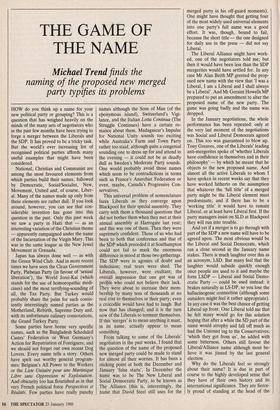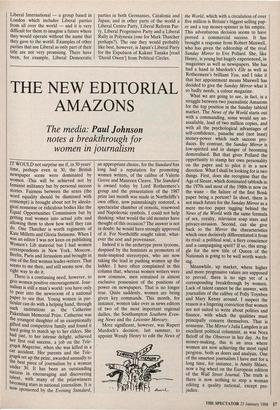THE GAME OF THE NAME
Michael Trend finds the
naming of the proposed new merged party typifies its problems
HOW do you think up a name for your new political party or grouping? This is a question that has weighed heavily on the minds of the many sets of negotiators who in the past few months have been trying to forge a merger between the Liberals and the SDP. It has proved to be a tricky task. But the world's ever increasing list of recognised political parties affords many useful examples that might have been considered.
National, Christian and Communist are among the most favoured elements from which parties build their names, followed by Democratic, Social/Socialist, New, Movement, United and, of course, Liber- al. Many of the names made up only from these elements are rather dull. If you look around, however, you can see that con- siderable invention has gone into this question in the past. Only this past week we saw a party in Haiti that — as an interesting variation of the Christian theme — apparently campaigned under the name of the Incarnation of the Virgin Mary. This was in the same league as the New Jewel Movement in Grenada.
Japan has always done well — as with the Green Wind Club. And in more recent times we have seen the Clean Government Party, Plebeian Party (in favour of 'sexual liberation'), the World Jorei-Kai (which stands for the use of homoeopathic medi- cines) and the most terrifying-sounding of all, the Tax Party. But Turkey would probably share the palm for such consis- tently interestingly named parties as the Motherland, Rebirth, Supreme Duty and, with its unfortunate culinary connotations, the Grand Turkey Party.
Some parties have borne very specific names, such as the Bangladesh Scheduled Castes' Federation or West Germany's Action for Repatriation of Foreigners; and we should not forget our own recent Dog Lovers. Every name tells a story. Others have spelt out worthy general program- mes: Belgium's All Power to the Workers or the Liste Unitaire pour une Martinique Libre sans Oppression ni Exploitation. And obscurity too has flourished as in that very French political force Perspectives et Realites. Few parties have really punchy names although the Sons of Man (of the eponymous island), Switzerland's Vigi- lance, and the Italian Lotta Continua (The Struggle Continues) have a certain ro- mance about them. Madagascar's Impulse for National Unity sounds too exciting while Australia's Farm and Town Party rather too staid, although quite a congenial sounding one to dress up for and attend in the evening — it could not be as deadly dull as Sweden's Moderate Party sounds. One would probably avoid those names which seem to be contradictions in terms such as France's Anarchist Federation or even, maybe, Canada's Progressive Con- servatives.
This universal problem of nomenclature faces Liberals as they converge upon Blackpool for their special assembly. They carry with them a thousand questions that did not bother them when they met at their annual assembly at Harrogate last year; and this was one of them. Then they were supremely confident. Those of us who had been to both that conference and that of the SDP which preceded it at Southampton could not fail to mark the enormous difference in mood at those two gatherings. The SDP were in agonies of doubt and indecision; real tears were shed. The Liberals, however, were exultant; the overall impression that one got was of people who could not believe their luck. They were about to increase their mem- bership by many tens of thousands at no real cost to themselves or their party; even a crocodile would have had to laugh. But now that has changed; and it is the turn now of the Liberals to torment themselves. If this 'merger' is to mean anything it must, in its name, actually appear to mean something.
From talking to some of the Liberals' negotiators in the past weeks, I found that the question of the name of the proposed new merged party could be made to stand for almost all their worries. It has been a sticking point at both the December and January 'false starts'. In December the name was to be The New Liberal and Social Democratic Party, to be known as The Alliance (this is, interestingly, the name that David Steel still uses for the merged party in his off-guard moments). One might have thought that getting four of the most widely used universal elements into one party's full name was a good effort. It was, though, bound to fail, because the short title — the one designed for daily use in the press — did not say Liberal.
The Liberal Alliance might have work- ed, one of the negotiators told me; but then it would have been less than the SDP mergerites would have settled for. In any case Mr Alan Beith MP greeted the prop- osed new name with the view that 'I was a Liberal, I am a Liberal and I shall always be a Liberal'. And Mr Geraint Howells MP prepared to put an amendment to alter the proposed name of the new party. The game was going badly and the name was dropped.
In the January negotiations, the whole performance has been repeated: only at the very last moment of the negotiations was Social and Liberal Democrats agreed on. This too was guaranteed to blow up.
Tony Greaves, one of the Liberals' leading anti-mergerites spoke of 'whether Liberals have confidence in themselves and in their philosophy' — by which he meant that he objects to the new proposed name. And almost all the active Liberals to whom I have spoken in recent weeks say that they have worked hitherto on the assumption that whatever the 'full title' of a merged party might be the Liberal element must predominate; and if there has to be a `working title' it would have to remain Liberal, or at least have Liberal first. If the party managers insist on SLD at Blackpool they will run into trouble.
And yet if a merger is to go through with part of the SDP a new name will have to be agreed upon. The most obvious would be the Liberal and Social Democrats, which ran a close second in the January name stakes. There is much laughter over this as an acronym, LSD. But many feel that the laughter would subside quickly enough once people are used to it and maybe the form LSDP — Liberal and Social Demo- cratic Party — could be used instead: it brakes naturally as LS-DP, so you lose the hallucinogenic connection (although some outsiders might feel it rather appropriate).
In any case it was the best chance of getting Liberal up front. One Liberal told me that he felt many would go for this solution hoping that after a while the SD part of the name would atrophy and fall off much as had the Unionist tag to the Conservatives; `which they got from us', he added with some bitterness. Others still favour the Liberal/Alliance name although most be- lieve it was jinxed by the last general election.
Why do the Liberals feel so strongly about their name? It is due in part of course to the highly developed sense that they have of their own history and its international significance. They are fierce- ly proud of standing at the head of the Liberal International — a group based in London which includes Liberal parties from all over the world — and it is very difficult for them to imagine a future where they would operate without the name that they gave to the world. Examples of other parties that use Liberal as only part of their title are not very promising. There have been, for example, Liberal Democratic parties in both Germanies, Catalonia and Japan; and in other parts of the world a Liberal Centre Party, Liberal Reform Par- ty, Liberal Progressive Party and a Liberal Rally in Polynesia (one for Mark Thatcher perhaps?). The one they would probably like best, however, is Japan's Liberal Party for the Expulsion of Kakuei Tanaka [read `David Owen'] from Political Circles.



























































 Previous page
Previous page